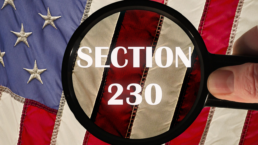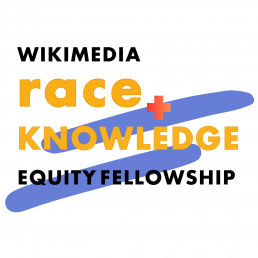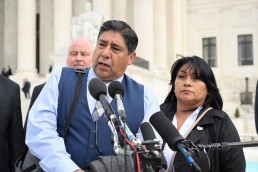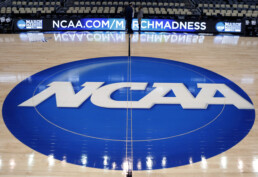Gonzalez v Google: Supreme Court Preserves Section 230, Empowers Marginalized Voices
May 19, 2023Innovative Thought LeadershipAdvocacy,Innovative Thought Leadership
The Empowerment of Marginalized Voices by Section 230 Preserved by the Supreme Court
Today the Supreme Court declined to disrupt the framework through which Section 230 of the Communications Decency Act promotes access to knowledge and free speech through the Internet. Finding that the plaintiffs’ complaint appears insufficient to provide a basis for their substantive claims, the Court refrained from analyzing the possible application of Section 230’s online platform immunity provisions to such claims.
“The Supreme Court’s ruling in Gonzalez vs. Google implicitly acknowledges the complexity of the issues and interests impacted by Section 230, including the need to preserve venues through which marginalized and vulnerable voices and perspectives can be heard,” said Lateef Mtima, Director of the Institute for Intellectual Property and Social Justice. “The Amicus brief filed by the Scholars of Civil Rights and Social Justice highlighted these concerns, in an effort to aid the Court in understanding the importance of Section 230 in protecting the Internet as a marketplace for diverse and non-traditional ideas, including intellectual property achievement by marginalized creators. The Court’s decision today preserves the status quo achieved by Section 230 in balancing access to knowledge and speech interests with the goal of protecting the public from harmful and malicious conduct on the Internet.”
The Supreme Court’s decision can be found here.
The Institute for Intellectual Property and Social Justice works to promote social justice in the field of intellectual property law and practice, both domestically and globally. Advocating for core principles of socially equitable access, inclusion, and empowerment throughout the IP ecosystem, IIPSJ’s work ranges broadly and includes scholarly examination of IP law from a social justice perspective; advocacy for social justice cognizance in the shaping and implementation of IP legislation and policy; initiatives to increase the diversity of the IP bar; and programs which promote greater awareness and understanding of IP protection, particularly among historically and currently disadvantaged and underserved groups, to empower them to exploit intellectual property effectively.
Wikimedia Highlights WRKE Fellow Contributions in Inaugural Year Review
April 19, 2023WRKE Fellowship,2022-23 WRKE Fellow,Innovative Thought Leadership,Leading IP DiscourseBlog,Innovative Thought Leadership
Interested in learning about the “Why?” behind the Race and Knowledge Equity Fellowship program? Our partners at Wikimedia published a great piece on the Equity Fund where current IIPSJ fellow, Shreyanka Mirchandani Changaroth also received a special mention and quote:
IIPSJ’s inaugural Wikimedia Race and Knowledge Equity Fellow is Shreyanka Mirchandani Changaroth, a legal expert who has lived and worked in Singapore, Canada, and the United Kingdom, and is called to the Singapore bar. Shreyanka will lead work with IIPSJ to explore ways to impact IP policy in the US through community engagement. “We can now focus our efforts on tackling grassroots community education around intellectual property, something that goes to the very core of racial equity in the technological society,” said Shreyanka, when describing the new Fellowship.
Read their full article below.
[CLOSED 8/11/23] Applications Now Open: 2023-24 Wikimedia Race and Knowledge Equity Fellow
April 10, 2023WRKE Fellowship,HiringBlog
The inaugural year for the Wikimedia Race and Knowledge Equity (WRKE) Fellowship has been in a success. Now, thanks to continued generous support from our partners at the Wikimedia Foundation Knowledge Equity Fund, IIPSJ is pleased to announce that we are currently accepting applications to hire a new WRKE Fellow for the 2023-2024 year. You can view and download the full position announcement here.
Also in the coming weeks, be on the look out for resulting fellowship research and scholarship materials from our current fellow, Shreyanka Mirchandani Changaroth.
Questions and concerns may be directed to Tashia Bunch at Tashia.bunch@iipsj.org.
Blog Post: 2022 HBCU Summer Interns join IIPSJ
August 5, 2022Diversifying IP PracticeBlog,Policy
2022 Summer Interns

Phoebe Ogunwobi is a rising 2L at North Carolina Central School of Law. Phoebe was born and raised in London, United Kingdom. She has a MPS in Paralegal studies from The George Washington University in Washington, D.C. and a BA in Political Science from The University of North Carolina at Greensboro. Before attending law school Phoebe worked in both law and technology fields and hopes to continue to strengthen her interests in Intellectual Property and International Law.
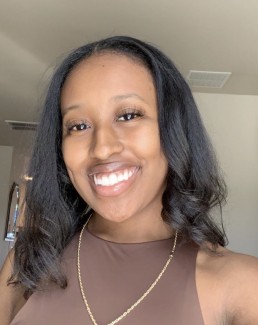
Leandre’a Scott is a rising second-year student at North Carolina University School of Law. Leandre’a graduated from East Carolina University with a Bachelor of Science in Biology. She has an interest in Intellectual Property law and aims to complete a patent clinic in the fall. Leandre’a strives to be a powerful force in anything she does and enjoys learning new things and then utilizing that knowledge for the better. Leandre’a is excited to continue to learn and grow within the IP community.
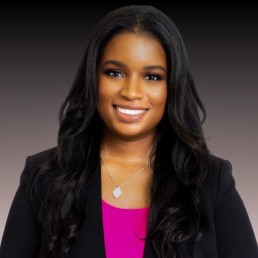
Leeandria Williams is an evening student at Southern University Law Center where she is a member of the Intellectual Property Law Association and the Fashion Law Society. She currently works in the client development department at Akerman LLP as a Senior Communications Specialist. A native of Houston, Texas, she received her undergraduate degree in journalism from Howard University in 2012. Outside of her professional and educational duties, she is an active member of Alpha Kappa Alpha Sorority, Incorporated and volunteers at various community events. She also proudly represents her hometown as the reigning Ms. Black Houston USA 2022.
Blog Post Legislation Update
October 12, 2021Inventor DiversityBlog,Policy
Proposed legislation and IP social justice
Device Access for Every American Act
The Device Access for Every American Act was introduced to both houses of Congress on September 14, 2021. The bill, which was introduced by Senator Raphael Warnock of Georgia and Congressman Donald McEachin of Virginia, claims to authorize the Federal Communications Commission (“FCC”) to create programming that allows Americans in need to redeem $400 vouchers so that they may buy laptops, tablets, computers or other devices. This legislation includes a proposal for $5 billion in federal funding for the establishment and implementation of the program. It would permit two low-income individuals per household to receive the vouchers so that families are able to have multiple devices. This effort, the Act additionally claims, would direct the FCC to integrate with device retailers as program participants, promote the program, and assist eligible Americans with enrolling in the program. Read the full text of the bill here.
Unleashing American Innovators Act of 2021
On September 21, 2021, U.S. Senators Thom Tillis and Patrick Leahy introduced The Unleashing American Innovators Act of 2021 as part of a bipartisan effort to amend the Leahy-Smith America Invents Act by addressing satellite offices of the United States Patent and Trademark Office (“USPTO”). The bill aims to expand access to the patent system for those who wish to participate in it by proposing the establishment of a sixth regional office in the Southeastern U.S. and creating “community outreach” offices around the country to provide support to potential patent seekers. If passed, the Act would create a program for first-time patent applicants which would create additional resources for assisting applicants with an application following a denial. The bill also seeks to reduce statutorily required fees for “small and micro entities” through amendments to the language of 35 U.S.C. 41(h) and the Leahy-Smith America Invents Act. Read the full text of the bill here.
Pride in Patent Ownership Act
Accompanying their introduction of the Unleashing American Inventors Act of 2021, U.S. Senators Thom Tillis and Patrick Leahy introduced the Pride in Patent Ownership Act to “ensure that the public has access to the true owner of a patent.” The bill aims to resolve the issue of costly litigation that parties undergo in identifying the beneficial owner of a patent by promoting transparency and creating a mandatory reporting requirement for patent owners. The reporting requirement would apply to the initial issuance of a patent and any subsequent transactions which results in a change in the “true ownership” of the patent. The mandatory reporting requirement, according to the bill’s official press release, would prove beneficial in instances where small businesses hope to identify the true patent owner for purposes of obtaining a license. Read the full text of the bill here.
Blog Post UIC Law Name Change
UIC Drops John Marshall Name
by Delaney Halvey & IIPSJ Staff
Beginning on July 1st, 2021, The John Marshall Law School will no longer exist as it has for 122 years. The board of trustees voted in late May to rename the school University of Illinois Chicago School of Law, after a months-long review process spurred on by the rise of the Black Lives Matter movement after the murder of George Floyd in the summer of 2020.
The school’s original namesake, John Marshall, was not always widely viewed as a controversial historical figure. The 19th century jurist is referenced in the naming of more than a dozen other schools in the US, and has long been esteemed for his role in forming the American judicial system in his 34 year tenure as Chief Justice of the Supreme Court. However, Marshall also owned slaves for most of his life and rendered a number of judicial decisions in the favor of slave owners, a reality recognized by several petitions circulating online regarding this and other “John Marshall” institutions.¹
UIC Chancellor Michael Amiridis said of the change that a “thorough and carefully studied process [was followed] that included input from all corners of the institution and beyond, considered issues of racial injustice and aimed to ensure that our university continues to be a place where diversity, inclusion and equal opportunity are supported and advanced.” The change leaves only two law schools bearing Marshall’s name: Atlanta’s John Marshall Law School and the Cleveland Marshall College of Law. As reported by the National Jurist, “a spokesperson for Atlanta’s John Marshall said of the move: ‘Our Board of Directors is aware of UIC John Marshall’s decision and has no further comment at this time.’ Cleveland Marshall has also declined to comment. Earlier, it announced it was forming a law school name committee to look into the appropriateness of the name.”²
Expressive works of historical tribute and affiliation can implicate complex issues of IP Social Justice. Questions can arise as to the messages they intend to communicate, including the actions they intend to honor, and the attendant effect upon the mandate of equitable access, inclusion, and empowerment inherent to the social function of the IP system. These issues can be as multifaceted as the lives of the historical figures involved, and there is no one size fits all solution. Instead, resolution of these issues begins with the individual or institutional will to engage in difficult conversations toward forging, or re-forging, the national identity. The social breadth and significance of IP protection is germane to these conversations, and every stakeholder in the IP ecosystem has an interest in their conclusions. We encourage you to join IIPSJ in participating in and helping to shape this national discourse.
[1] https:/https://www.acslaw.org/expertforum/no-law-school-should-be-named-for-john-marshall/
[2] https://www.nationaljurist.com/national-jurist-magazine/uic-drops-john-marshall-name-citing-slave-owning-past
Blog Post A Historic Victory for Student Athlete’s IP Rights—The NCAA Changes NIL Compensation Rules
July 29, 2021Grassroots IP AwarenessBlog,Policy,Grassroots IP Awareness
A Historic Victory for Student Athlete’s IP Rights—The NCAA Changes NIL Compensation Rules
by: Cole Baker & IIPSJ Staff
Starting July 1, the NCAA changed its rules regarding student athlete commercial use and exploitation of their names, images, and likenesses (“NIL”) and their accompanying intellectual property rights, referred to as the right of publicity. For the first time in its history, the NCAA will allow member-schools to permit student-athletes to pursue opportunities to profit from their NIL and publicity rights, such as in product endorsement deals. The NCAA change in policy will finally allow student-athletes to participate in the billion dollar NIL industry derived from their talent, eradicating decades of unfair exploitation and IP social injustice. The NCAA adopts the new rules on an interim basis until “federal legislation or new NCAA rules” are enacted.
College Athletics as a Path to Education: The “Play for Pedagogy” Bargain
The modern tradition of the collegiate athlete is rooted in a bargain of the exchange of young athletic talent for a college education. However, with the advent of mass televised events and games, colleges and universities changed that bargain and insisted that student-athletes also allow them to exploit their NIL IP rights, but without adding anything to the student-athletes’ side of the deal. By unilaterally restructuring the student-athlete bargain, NCAA schools gained as much as $11 billion in revenues annually.¹ Seemingly everyone shared in these revenues, with the NCAA president earning more than $2 million a year, the top-50 Division 1 football coaches earning a median salary of more than $4 million a year, and NCAA schools receiving hundreds of millions of dollars in endorsements from athletic brands.²
Everyone benefited except the student-athletes. Under NCAA rules, students were not only denied a share in these revenues, they were also prevented from engaging in their own deals to benefit from their NIL intellectual property. For instance, for most of the past two decades, college athletes had their images and likenesses copied into video games but were not compensated by the video game makers. These rules even resulted in the loss of two University of Iowa swimmer’s eligibility due to a clothing line they created. The clothing line had nothing to do with swimming; however, the GoFundMe page that they used to start production mentioned that the two had met by swimming together at Iowa. In order to regain eligibility, both swimmers had to remove any pictures of themselves from the business’s website as well as any mention of University of Iowa swimming.³
A Policy Shift Toward IP Social Justice
In the wake of growing public criticism, targeted social activism, and a rapidly changing legal landscape, the NCAA Board of Governors voted on June 30, 2021 to approve a new policy, effective July 1. The Board announced that it had adopted a, “uniform interim policy suspending NCAA name, image and likeness rules” for student-athletes in every sport.
The policy is effective across “all three divisions,” and provides a four-prong guidance structure for member schools. The first guidance indicates that “Individuals can engage in NIL activities that are consistent,” with each school’s state law, and that schools “are responsible for determining whether those activities are consistent with state law.” The second indicates that athletes in states without a NIL statute can “engage in this type of activity” in accordance with NCAA rules. The third allows athletes to retain a “professional services provider” for advice in pursuing NIL monetization opportunities. Finally, the fourth guidance urges athletes to report their NIL activities to their schools.
The NCAA’s change in policy comes in response to immense public pressure, including new state laws and successful challenges to NCAA policies in the courts. In 2019 California enacted the “Fair Pay to Play Act”, which prohibits schools from preventing their student-athletes from exploiting their NIL intellectual property, and more than 30 other states soon passed similar legislation. Recently, in NCAA v. Alston the United States Supreme Court ruled in favor of an antitrust challenge to the NCAA’s policies, with Justice Kavanaugh noting that “the NCAA’s current compensation regime raises serious questions under the antitrust laws.”4 And the NCAA’s change in policy comes in the wake of a national conversation about systemic racial exploitation. While the NCAA’s compensation policies affect student-athletes of every race and gender, the disproportionate impact on black athletes, who make up the majority of athletes in the NCAA’s top revenue generating sports, football and basketball,5 has long been evident.
IIPSJ has long advocated for and today welcomes this progressive evolution in NCAA policy, which implements an IP social justice perspective toward student-athlete NIL intellectual property rights. While the policy change does not require schools to pay student-athletes, and still allows NCAA schools to capitalize on student-athlete NIL intellectual property through televised games, merchandising deals, and the like, the change in policy finally allows the student-athletes the chance of also benefiting from their intellectual property.
The NCAA is not out of the weeds of litigation, however. There is another consolidated class action in progress in the Northern District of California where athletes are claiming the NCAA’s rules on NIL are in violation of antitrust laws. Notwithstanding the NCAA’s changed policy, the suit goes further than what the NCAA’s policy change did. It seeks to permanently tear down all remaining NIL strictures. Furthermore, the suit seeks to recoup and distribute money to athletes made by the NCAA and its member conferences in licensing television rights.6
As the NCAA acknowledges, federal legislation is necessary to provide a national, uniform framework for student-athlete use of their NIL intellectual property rights. In the meantime, the new NCAA policy is an important step toward providing student-athletes a meaningful stake in the IP system, and fulfilling the social justice obligations of the intellectual property regime.
¹ Robert Zafft, Forbes, The Supreme Court, NCAA, and Juneteenth (July 5, 2021).
² Id.
³ Erin Jordan, The Gazette, Hawkeye swimmers’ clothing line causes NCAA violation (August 14, 2017).
4 NCAA v. Alston, 141 S. Ct. 2141, 2208 (2021).
5 NCAA.org, NCAA Demographics Database (March, 2021).
6 Zachary Zagger, Law360, NCAA Athletes Say Name, Image ‘Experiment’ Proves Case (July 27, 2021) (January 9, 2021).
For more on this topic, check out this page: https://iipsj.org/iipsj-advocacy/student-athlete-nil/
Blog Post 2021 Summer Interns
June 17, 2021Diversifying IP PracticeBlog,Policy,Diversifying IP Practice
Meet Our 2021 Summer Interns
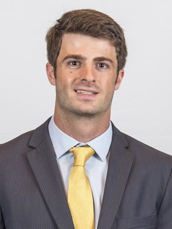
Cole Baker is a rising 2L at the University of Maryland Francis King Carey School of Law. He is originally from Denver, Colorado. Cole graduated cum laude from the University of Delaware in the spring of 2020 where he played on the Division One men’s lacrosse team and double majored in Political Science and Economics. There, Cole was the chair of the men’s lacrosse team’s “Academic Weapons Committee,” an academic tutor for Political Science, Economics, and Science courses, and was a member of the Horn Center for Entrepreneurship. At Carey Law, Cole is a member of the National Trial Team which participates in mock trial competitions throughout the nation.

Erin Williamson is a rising third-year law student at The George Washington University Law School where she is concentrating her studies in intellectual property. Her interest in intellectual property began during her time as an undergraduate at Drexel University studying Music Industry Business. Erin aspires to pursue a career in copyrights and trademarks to advocate for the rights of creators. When she is not busy studying, she enjoys weightlifting and discovering new music for her ever growing Spotify library.

Delaney Halvey is a rising second semester 3L at Georgetown University Law Center (graduating in December 2021.) Delaney grew up in Tucson, Arizona, where she enjoyed hiking, camping, trail running, and mountain biking. In 2018, Delaney graduated from Texas A&M University with a degree in industrial engineering and minors in cybersecurity and math. As a college student, she knew she wanted to attend law school and was able to shadow several members of Raytheon’s legal department when she worked there as an engineering intern. As a law student, Delaney has worked in D.C.’s Landlord Tenant Resource Center, as a Research Assistant and Teaching Assistant at Georgetown, as an intern for the U.S. Office of Personnel Management Inspector General, and in her personal favorite job as a tennis coach at Brentwood Elementary. Delaney am excited for the opportunity to now be working for IIPSJ, and is looking forward to everything she will learn this summer.
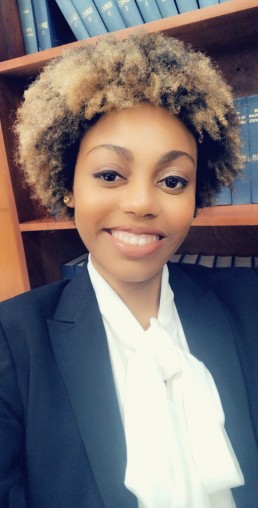
Sara Griffiths was born and raised in Kingston, Jamaica. After relocating to the United States for high school she went on to graduate magna cum laude from Miami-Dade College and thereafter transferred to American University and completed her education at the School of International Service. While there she earned a bachelor’s degree in International Studies with concentrations in Identity, Race, Gender and Culture and Peace, Global Security and Conflict Resolution with a regional focus in Latin America and the Caribbean. She is presently a law student at Georgetown University Law Center where she participates in both the Global Law Scholars and Human Rights Associates Program. She has interned at the Jamaican Court of Appeal, the 39th regional Caribbean Community (CARICOM) Heads of State Conference, and the Embassy of Jamaica at Mexico. She has particular interests in international human rights and public international law and intersectional and critical race theory and is fluent in English as well as Patois—the Jamaican Creole dialect.
Blog Post TPAC/PPAC Nominations
USPTO Seeking Nominations for Vacancies on the TPAC and PPAC
by Delaney Halvey
The U.S. Patent and Trademark Office (USPTO) is seeking nominations to fill upcoming vacancies on the Trademark Public Advisory Committee (TPAC) and Patent Public Advisory Committee (PPAC.)[1] TPAC and PPAC committee members are responsible for representing the diverse interests of the users of the USPTO with respect to trademarks and patents. Some of their recent work included in the TPAC and PPAC 2020 Annual Reports includes: a TPAC commendation of Trademark Operations during the COVID-19 pandemic, including modernization of IT products and adaption to teleworking; formation of a PPAC AI Subcommittee to provide guidance to USPTO leadership; TPAC review of the TTAB expedited cancellation pilot program aimed at “decluttering” the Trademark Register; and PPAC oversight of a Congress-driven effort to diversify inventorship.[2]
As these projects highlight, the members of these committees have an important and influential role in USPTO operations. They keep the USPTO accountable to their goals, both self-generated and passed down from Congress, while also providing input into future goals. Because there are several degrees of separation between the operations of the USPTO and the votes of stakeholders, the committees remind USPTO leadership of these stakeholders’ interests. Examples of this middleman role include public meetings, which provide a public forum for interested parties to air their opinions, and fee setting hearings, which allow for stakeholder testimony.
For the committees to be effective representatives of the community who uses the USPTO system, it is vital that their membership reflect the diversity of this community. Federal law requires each member to have a “substantial background and achievement in finance, management, labor relations, science, technology, and office automation,”[3] and provides only that small and large entity applicants must be represented.[4] Perhaps as is to be expected, the committees have been historically biased in memberships towards representatives of large entity applicants. Aside from the size of the entity applicant, other diversities the committee membership would benefit from reflecting include: the racial and cultural background of applicants, the industry of applicants, the gender identity of applicants, and the geographic location of applicants.
Nominations must be submitted electronically by completing the corresponding Public Advisory Committee application: https://tinyurl.com/ynae4a67 for the Patent Public Advisory Committee, or https://tinyurl.com/hcux6462 for the Trademark Public Advisory Committee. These applications ask for detailed contact information for both the nominating and nominated party, as well as information regarding publications, awards, credentials, and details about the organization represented by the nominated party. Nominations will be accepted on or before July 9, 2021.
[1] https://www.uspto.gov/about-us/news-updates/uspto-seeks-nominations-patent-and-trademark-public-advisory-committees
[2] https://www.uspto.gov/sites/default/files/documents/TPAC_2020_Annual_Report.pdf & https://uspto.gov/sites/default/files/documents/PPAC_2020_Annual_Report.pdf
[3] 35 U.S.C. 5(b)(3)
[4] https://www.federalregister.gov/documents/2021/05/25/2021-11047/patent-and-trademark-public-advisory-committees
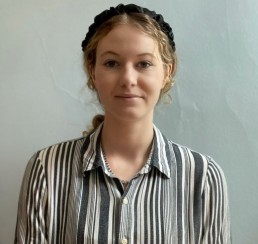
Delaney Halvey is a summer intern with IIPSJ. She is a rising second semester 3L at Georgetown University Law Center (graduating in December 2021.)

